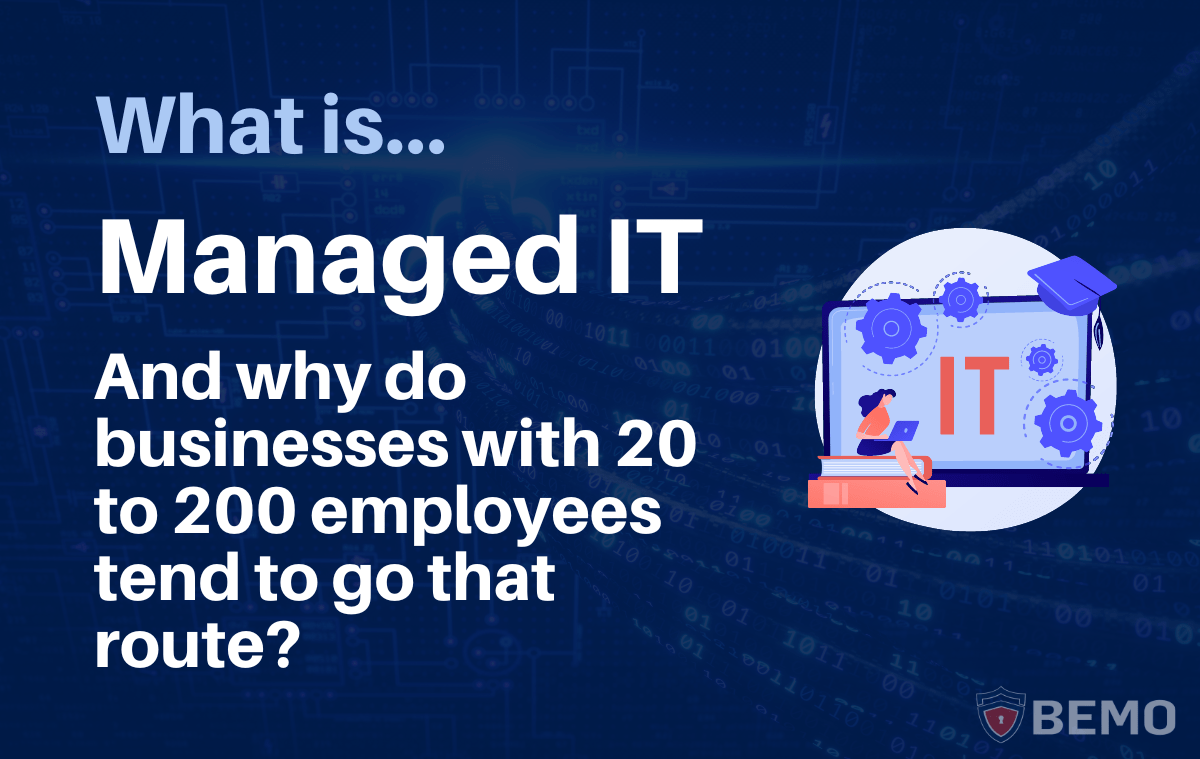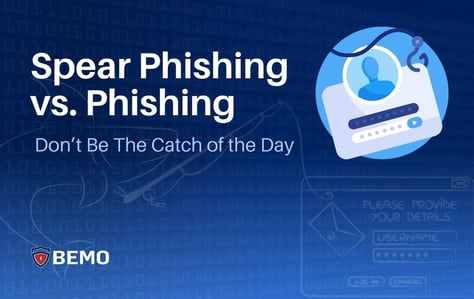
If you're googling "what is Managed IT" or "IT Support" then you're probably the CEO, COO, or CFO of a small business with 10 to 50-ish employees. You're also probably starting to get pretty tired of being the default part-time IT person simply because you know a tad more about technology than the rest of your people.
Most likely, you're realizing that it's just no longer possible for you to be dealing with this stuff, especially as technology gets too complicated for one person to handle. Now you're looking for a way to offload this work so you can get back to your real job: making your company shine.
So... what is Managed IT? Managed IT is simply the act of outsourcing your IT to another company.
Want to learn more? Watch the interview below with BEMO Sales Engineer Brandon Lecoq:
Or check out one of our customer case studies 👇
Why companies with <50 employees get Managed IT
- Cost-Efficiency
- Bandwidth
If your business has fewer than 50 employees, it makes a lot of financial sense to outsource your IT. You're big enough that the CEO, COO, CFO simply can't handle all the tech problems but you're not quite big enough to hire someone internally. Why? You're looking at a $70k (minimum) salary just for an entry-level IT Specialist, plus a budget for tools and technology they'll need to run a tight ship (heck, even a mediocre ship) and despite these certain costs, they still can't be expected to fix or know how to do absolutely everything.
On top of that, as a small business owner, you are flooded with a plethora of responsibilities daily. I'm guessing that IT fires are simply put out, rather than their source being assessed and plans to avoid them in the future being hatched. There lacks an organized, thought-out plan for structuring your technology.
Plus, there is the day-to-day help your employees need (I mean, how do you clear your Outlook cache? And what is the best way to use Teams?). Instead of just reacting to "tickets", a Managed IT company will help you be proactive about leveraging your technology, by assessing the following questions (and more):
- How should our files be organized?
- If you were ever hacked, how would you know?
- If an employee is fired, how quickly can you revoke access to all of their company accounts?
- Do you have a separate set of credentials for every account and computer login, or do you have Single-Sign-On (SSO)?
- If someone decides to work from an unsecured wifi location such as the public library, airport, or cafe shop, do you have a way to detect this and force the use of a VPN?
- The anti-phishing software that you bought let an email slip and now someone clicked on an email and someone is mass emailing all of your customers. What do you do? Click on the picture below to read about phishing and something you may not have heard of: spear phishing 😲
Why companies with 51 to 200 employees get Managed IT
- Need for Specialists
- Bandwidth
If your business has 50 to 200 employees, there usually is a team of 1 to 2 IT people that are "IT generalists" and so, understandably, they need some augmentation. Adding in supplemental IT specialists helps with more complicated projects.
For example:
- If you are the IT staff of a company, chances are you don't have a lot of experience with data migrations because companies don't move from one thing to another all the time. So, when you have to do a migration, it's nice to have someone on your team who has done it before (many, many times) rather than hoping for the best your first time around.
- You bought a bunch of expensive cybersecurity software that tells you there's a 99% chance you won't get hacked. But then you still get hacked. When this happens, you'll need a Cybersecurity Engineer to resolve this, but you probably don't need them full-time either.
- You have experience with SQLServer, but one of your engineers insists on using PostgresSQL. You don't have experience with open-source software, so you could use help from a Linux Engineer for a few hours, but you probably don't need that person full-time either,
For bigger companies, a Managed IT company gives you the benefit of access to a deep bench of specialists without having to put all of them on your payroll.
If you're in IT then you know it's literally impossible to be expected to know everything. No one has the time or experience to be an expert in networking, cloud migrations, cybersecurity, hardware, and then also get up to speed on everything Microsoft 365, see what's new in Linux, and Cisco, etc... your head would explode 🤯 Sure you can handle most of the day-by-day stuff, but you're trying to get ahead.
Managed IT allows you to get ahead by giving you access to specific resources that 1,000+ employee companies have, while only paying the price of having one additional IT staff.
Why companies with 201+ employees don't need Managed IT
While this isn't an exact science, by the time you reach the 200 to 500 employee zone, technology has become a real beast and there are 3 to 7 IT people. You know this is you when instead of having a "Directory of IT", there is also a Director of Infrastructure!
At this size not only do you have the budget for all these specialists, you honestly need each of them working you full-time.
Cybersecurity hacks are more frequent and more sophisticated and file management certainly becomes a nightmare without someone dedicated to preventing 500 employees from saving and sharing any which way they please. Plus, the engineering team is constantly testing your knowledge of virtual machine operating systems and network configuration.
While you may not feel "Enterprise" just yet, you most definitely are from a technology standpoint, and having your IT outsourced just isn't for you anymore.
The Wrap Up
So, which category do you fall into? Want to learn more about Managed IT? Click here to see our resource page.
At BEMO we are now offering Managed IT with our Silver, Gold, Diamond, and Platinum Cybersecurity solutions. We strongly suggest the powerful duo of BEMO Platinum & Managed IT because it will get your organization ready for any compliance you decide to go after.
If you're in the first two camps and want to see what Managed IT might look like for you, check out our cost calculator below. No one from Sales will be calling you afterward, we promise, and it only takes 3 minutes to get a quote👇
Top 10 Posts
-
Windows 10 Pro vs Enterprise
-
Migrate From Gmail to Office 365: Step-By-Step Guide
-
Windows 10 Enterprise E3 vs E5: What's the Difference?
-
What are the 4 types of Microsoft Active Directory?
-
How to Migrate from GoDaddy to Office 365
-
Google Workspace to Office 365 Migration: A Step-by-Step Guide
-
How to Set Up Office 365 Advanced Threat Protection
-
10 Benefits of Microsoft Teams
-
Top 3 Reasons to Move From Google Drive to Microsoft OneDrive
-
How to remove Office 365 from GoDaddy (tips and tricks)
-2.png?width=1080&height=1080&name=Untitled%20design%20(5)-2.png)





Leave us a comment!